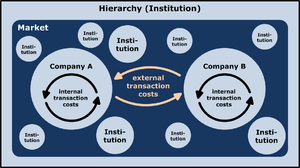Many people stress about the ‘cost of living’ but the ‘cost’
of living is not the only thing that makes demands on one. Institutional economics has developed the
concept of ‘transaction costs’. These are the costs, financial but also in
terms of time and stress, that occur when trying to find a new ‘supplier’. When I go to the ‘market’ to buy tomatoes I
have relatively straightforward choices between variety, quality, origin and
price. But, when I want to find a
dentist, mechanic or accountant, things become more complicated. The same is true if I want to buy, say,
bottling machinery that will preserve those tomatoes.
This has huge implications whenever people talk about, or
conceive of, ‘the market’. It means ‘trusted
trading partner’ becomes a criterion that is much more important than ‘best
deal on the street.’ I have
been working with some clients of my business for almost fifteen years, since I
first started it. I have been using the
services of some key suppliers for almost as long. These are smooth relationships, far removed
from the cut and thrust of spot markets.
I have good relations with these
people, all tried and trusted business partners.

When moving home (and especially country) developing these relationships
anew can be one of the hardest things.
This was especially noticeable when I moved from Wageningen to Brussels
five years ago. Most of the contacts I
made for things like a computer support, flat sharers etc., were achieved via the
local Couchsurfing group. Trying to find
a mechanic was hell (no-one in the Brussels Couchsurfing group had a car). The dentist, doctor and notary were found through
lists of British-speaking professionals on the UK Consulate’s web-site. But that was pretty much a stab in the dark.
I mostly went for those that were easily accessible by public transport.
Now I am going through the same process in Hendaye. The mechanic, handyman and translator are
already in place (though in some cases with reservations). The search is on for a doctor and
wood-supplier. It’s much easier in a
small town. You ask your acquaintances if they can recommend a (fill in gap
here). Sometimes it will just be a
friend of theirs, others someone who does give good service.
But I am trying to take my search a bit deeper here. I have recently joined a Jardin Collectif, which
I blogged about a few weeks ago. Jardins
Collectifs are a form of community supported agriculture (CSA) help move
farmers, growers and consumers move away from the brutality of spot markets and
into a mode of exchange that is more trust-based, offers them more continuity and
helps to balance the grower’s cash flow across the year.
If you don’t already belong to one try researching what is
available in your neighbourhood: a box scheme for fruit and veg (preferably
from a local grower) or a meat-bag scheme.
When living In Wageningen I even belonged to a group that had keys that
gave us access to a trailer full of dairy and meat products and an honesty
box. (I don’t think that model would
work in a larger city such as Brussels!!).
Let’s help farmers and growers move away from the insecurity associated
with reliance on spot markets and/or contracts with multi-national retailers.






